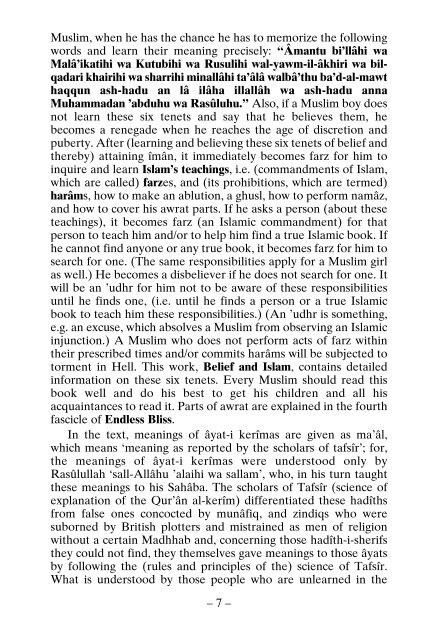Belief and Islam
BELIEF AND ISLAM star This work, Belief and Islam, originally was written in Persian under the title I’tiqâd-nâma by Hadrât Mawlânâ Khâlid al-Baghdâdî, a profound ‘âlim of Islam and a specialist in ma’ârif of tasawwuf. Hâji Faydullah Effendi of Kemah, a khalîfa of great walî Mavlânâ Mahmûd Sâhib, the brother of the author, translated the book into Turkish and named it Farâid-ul-fawâid which was printed in Istanbul in 1312 A.H.[1894]. Our bookstore had it translated again from the Persian original into Turkish and, some explanations and three chapters, published it with the title Imân ve Islâm in 1966. German, French and Arabic versions are also published by our bookstore. This book, explains five fundamentals of Islam, six fundamentals of îmân and the contemporary information about the matter and refutes those who are against Islam and those who are lâ-madbhabî.
BELIEF AND ISLAM
star This work, Belief and Islam, originally was written in Persian under the title I’tiqâd-nâma by Hadrât Mawlânâ Khâlid al-Baghdâdî, a profound ‘âlim of Islam and a specialist in ma’ârif of tasawwuf. Hâji Faydullah Effendi of Kemah, a khalîfa of great walî Mavlânâ Mahmûd Sâhib, the brother of the author, translated the book into Turkish and named it Farâid-ul-fawâid which was printed in Istanbul in 1312 A.H.[1894]. Our bookstore had it translated again from the Persian original into Turkish and, some explanations and three chapters, published it with the title Imân ve Islâm in 1966. German, French and Arabic versions are also published by our bookstore. This book, explains five fundamentals of Islam, six fundamentals of îmân and the contemporary information about the matter and refutes those who are against Islam and those who are lâ-madbhabî.
Create successful ePaper yourself
Turn your PDF publications into a flip-book with our unique Google optimized e-Paper software.
Muslim, when he has the chance he has to memorize the following<br />
words <strong>and</strong> learn their meaning precisely: “Âmantu bi’llâhi wa<br />
Malâ’ikatihi wa Kutubihi wa Rusulihi wal-yawm-il-âkhiri wa bilqadari<br />
khairihi wa sharrihi minallâhi ta’âlâ walbâ’thu ba’d-al-mawt<br />
haqqun ash-hadu an lâ ilâha illallâh wa ash-hadu anna<br />
Muhammadan ’abduhu wa Rasûluhu.” Also, if a Muslim boy does<br />
not learn these six tenets <strong>and</strong> say that he believes them, he<br />
becomes a renegade when he reaches the age of discretion <strong>and</strong><br />
puberty. After (learning <strong>and</strong> believing these six tenets of belief <strong>and</strong><br />
thereby) attaining îmân, it immediately becomes farz for him to<br />
inquire <strong>and</strong> learn <strong>Islam</strong>’s teachings, i.e. (comm<strong>and</strong>ments of <strong>Islam</strong>,<br />
which are called) farzes, <strong>and</strong> (its prohibitions, which are termed)<br />
harâms, how to make an ablution, a ghusl, how to perform namâz,<br />
<strong>and</strong> how to cover his awrat parts. If he asks a person (about these<br />
teachings), it becomes farz (an <strong>Islam</strong>ic comm<strong>and</strong>ment) for that<br />
person to teach him <strong>and</strong>/or to help him find a true <strong>Islam</strong>ic book. If<br />
he cannot find anyone or any true book, it becomes farz for him to<br />
search for one. (The same responsibilities apply for a Muslim girl<br />
as well.) He becomes a disbeliever if he does not search for one. It<br />
will be an ’udhr for him not to be aware of these responsibilities<br />
until he finds one, (i.e. until he finds a person or a true <strong>Islam</strong>ic<br />
book to teach him these responsibilities.) (An ’udhr is something,<br />
e.g. an excuse, which absolves a Muslim from observing an <strong>Islam</strong>ic<br />
injunction.) A Muslim who does not perform acts of farz within<br />
their prescribed times <strong>and</strong>/or commits harâms will be subjected to<br />
torment in Hell. This work, <strong>Belief</strong> <strong>and</strong> <strong>Islam</strong>, contains detailed<br />
information on these six tenets. Every Muslim should read this<br />
book well <strong>and</strong> do his best to get his children <strong>and</strong> all his<br />
acquaintances to read it. Parts of awrat are explained in the fourth<br />
fascicle of Endless Bliss.<br />
In the text, meanings of âyat-i kerîmas are given as ma’âl,<br />
which means ‘meaning as reported by the scholars of tafsîr’; for,<br />
the meanings of âyat-i kerîmas were understood only by<br />
Rasûlullah ‘sall-Allâhu ’alaihi wa sallam’, who, in his turn taught<br />
these meanings to his Sahâba. The scholars of Tafsîr (science of<br />
explanation of the Qur’ân al-kerîm) differentiated these hadîths<br />
from false ones concocted by munâfiq, <strong>and</strong> zindiqs who were<br />
suborned by British plotters <strong>and</strong> mistrained as men of religion<br />
without a certain Madhhab <strong>and</strong>, concerning those hadîth-i-sherifs<br />
they could not find, they themselves gave meanings to those âyats<br />
by following the (rules <strong>and</strong> principles of the) science of Tafsîr.<br />
What is understood by those people who are unlearned in the<br />
– 7 –

















